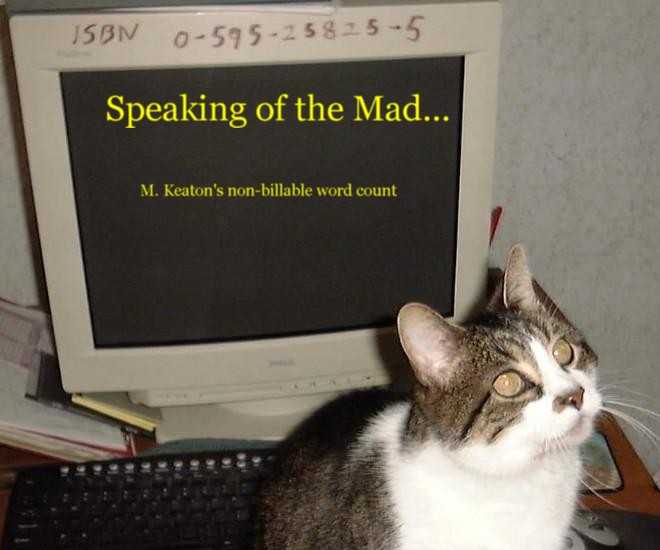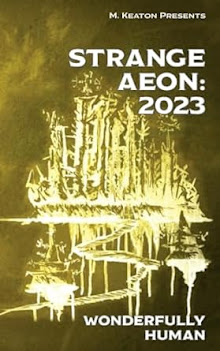Another reprint from the boss (lesser boss, not SHE WHO MUST NOT BE NAMED) because, as he put it to me earlier, "Once it's said, it shouldn't need resaid if it can be reread. That's the problem with kids today, if a book isn't brand-new, they won't read it. It leaves them stupid. I tell you, cat, no good comes of dealing with human beings."
So, without futher ado:
On Criticism
In the life of a writer, the twin dark arts of receiving and giving criticism are two of the most important to learn.
To accept and apply criticism, the author must first decide what it is that he actually wants from the critique. Is mere "I liked/disliked the piece" cheerleading enough or does the writer need more, and if so, how much more? There is no stock answer to this question; it varies from author to author, work to work, and from critiquer to critiquer. First and foremost, an author must learn to ask the proper questions if he intends to get useful answers. The author must be honest enough with himself to know what he needs, committed to the work enough to know what it needs, and know the critiquer well enough to properly gauge the weight of the criticism offered.
Anyone can give advice. It is the author's responsibility to sift through it to determine what is wheat and what is chaff. A common mistake is to confuse a good writer with a good critiquer, to assume that, because someone has sold a few books or works "in the industry" that they automatically know more about what is good for the story than someone with a less distinguished pedigree or even the author himself. This is not always the case—good critiquers tend to be better authors but the inverse is not always true.
This is part of learning to ask the right questions. A passage that may be clear to someone familiar with a particular genre may be impenetrable to a more generalized reader. Whether this is good or bad depends on who the author envisions as his listeners and what he wants for and from his story. Put another way, a swordfight rife with technical detail that excites a lifelong fantasy reader may not be as good for a given story as a swordfight described more emotively that excites the author's kid sister because she "finally understood what was going on."
Notice that I say the critiquer, not the critic. A critic is someone who loves their own voice and looks for what is wrong with a work. A critiquer is someone committed to making the work the best that it can be; they are, in effect, advocates of story. Separating the critics from the critiquers is the first step to learning to gauge a critique.
So, then, how does one become a good critiquer? Is there a singular formula that can be applied or is it an amorphous skill learned by trial and error? I fear the answer is a bit of both but there are definite steps you can take to give a useful critique. Practice will help you hone your skills, especially if you work with authors who know to ask the right questions.
The key unquantifiable part of giving a writer advice on their work is the art of presentation. The basics of what makes a good story—of clean prose, basic grammar, developed characters, clear settings, and consistent, compelling plots—remain unchanged from author to author and story to story. But there are many ways to say the same thing and a good critiquer should strive to understand the author and present the problems in the manuscript and suggestions for improvement in a manner that the author can accept and use. Some writers need a coach while others need a taskmaster, some a cheerleader, others a brutal bucket of cold water—if you truly want your critique to be useful, you will have to chose the most efficient way to present your observations. Try also to make certain that you are criticizing the work and not the genre.
The nuts and bolts are a bit simpler, read the author's mind. As dramatic as that sounds, it's the core of a useful critique. The author's goal is to tell the story they want to tell in the way they want to tell it. To help them reach it, you need to see that same goal or at least as close to it as possible. Since you cannot actually read minds (I'm assuming), you will have to use the next best alternative. The most useful thing you can do for any author is to tell them their own story. Read their work and then tell them what you saw—this is the plot, these are the characters, this is the setting, this is the effect it had on me. It seems redundant but, trust me, it is not. The author knows their story but they are too close to see objectively if what they wrote is the same as what you read. And, after you do this, if they should begin to explain "what they really meant", look them squarely in the eye and say, "All that stuff you're telling me now should have been in the story instead of the stuff that's there now."
Once this hurdle is overcome, most of your work is done and it is time to look at the technical details. Is the plot interesting? Is the central conflict large enough to support the rest of the story? Is the resolution satisfying? Does the plot carry the theme successfully? If there is a problem with the pacing the weakness is probably here as the author is trying to do too much too fast or stretch too little too long. Look closely at the narrative voice. Is it consistent with the work? Does the point of view help or hinder the plot and theme? Is the setting clear in your mind and is it fully developed? Are the characters deep and real instead of cutouts (this includes secondary characters as well as the main)? Is economy of stage maintained (that is, are the fewest possible characters used)? Characters who exist for no other purpose than to toss in a few lines that could be placed in another characters mouths should be cut and their functions moved. Would anybody care if the main characters fell down a well and drowned? If not, why? If so, why? Does the dialogue ring true? Does each character speak with their own voice or do they all sound like the narrator? Does the prose flow? Read the story aloud to insure there are no clumsy passages. Is the writing style clear and enjoyable to read? Most of all, did you like the work and if so or if not, why?
Sprinkle liberally with commas to make editors happy and you have a decent start. Remember too that critiquing doesn't just benefit the writer being critiqued; it helps the critiquer as well. The best way to learn is to teach and critiquing another writer's work is also learning to critique your own. It brings us full circle; the better you get at answering questions for other writers, the closer you come to learning the right questions to ask yourself.
(Sanctuary Press Writers' Workshop introduction, Penguicon 5)
Subscribe to:
Post Comments (Atom)





















No comments:
Post a Comment